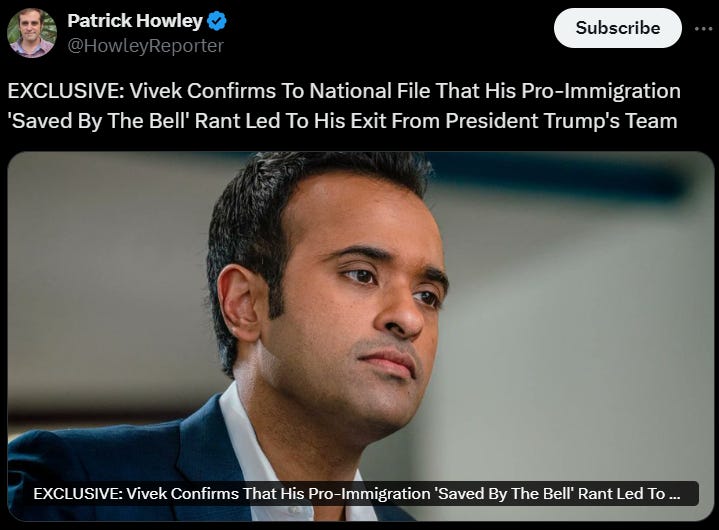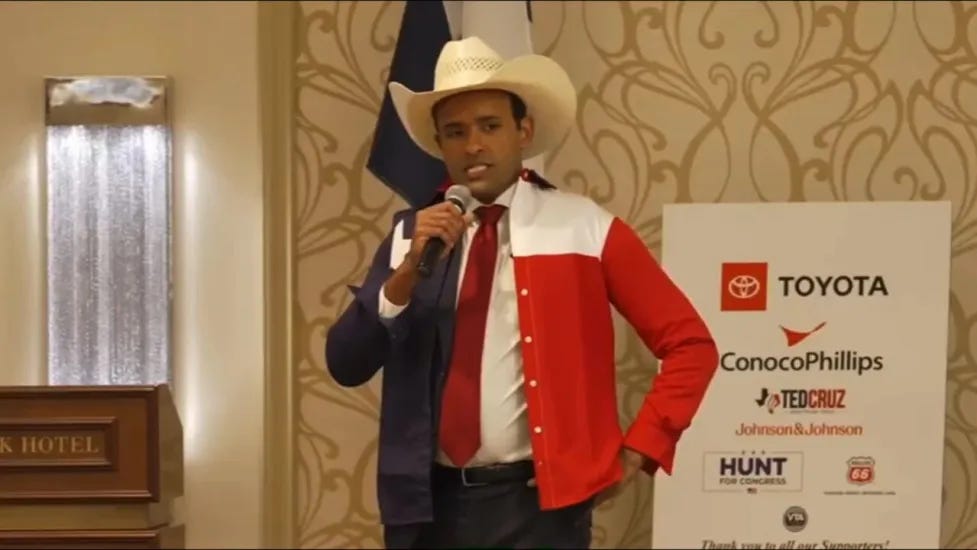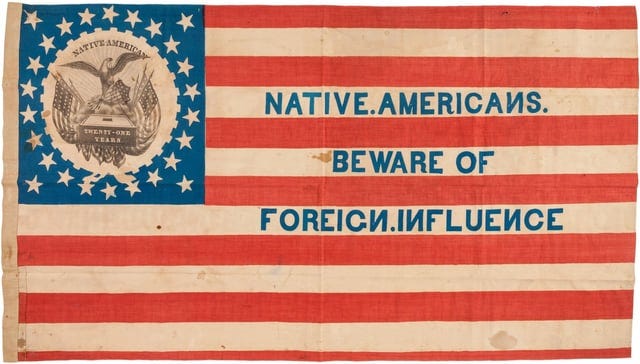No Common Ground to Start From
Thoughts on predatory outsiders, fragmentation of culture, and reclaiming identity
One bit of good news flying under the radar of Trump’s triumphant return to power is the downfall of Vivek Ramaswamy.
If you happen to read this article a few years hence, you will likely not have any idea who he is, so allow me to give a quick recap. Vivek was a slick-talking, Magic Dirt American from the finance world, a millionaire who made his bones on a classic pump-and-dump scheme centered around a useless drug. He came to national prominence by seeking the 2024 Republican Presidential Nomination, a contest he was doomed to lose because he was not American, worships demons, and was not Donald Trump. Nevertheless, he endeared himself to the midwits of the MAGA coalition (like Scott Adams) by being a brown guy who parroted populist rhetoric. However, the wiser tails of the Bell Curve quickly picked up on his suspicious background, and he ended up in sixth place, collecting fewer primary votes than anthropomorphic bowling ball Chris Christie.
Of course, Vivek knew he had no chance of beating Trump; his goal was to sufficiently establish himself as a lapdog in order to infiltrate the new administration. After Trump’s election, Vivek was mentioned both as a candidate to replace J.D. Vance as Ohio senator and as the co-head of the upcoming Department of Government Efficiency. Mission accomplished! Or so it seemed, until he and fellow non-American plutocrat Elon Musk publicly declared war on American workers on Christmas (a holiday that, if you’ll forgive me for pointing out, is not celebrated by Hindu pagans, even ones educated by Jesuits).
Thanks be to God, for He does not permit shapeshifting reptilians from Planet Soros to hide their true form forever, and the method the Lord contrived for Vivek’s downfall was both hilarious and instructive.
Vivek tweeted a now notorious TL;DR rant in defense of H1-Bs, centering on how stupid and useless actual Americans are. To put it in terms us slack-jawed bumpkins could understand, he invoked 1990s cultural touchstones Saved by the Bell and Family Matters: Americans foolishly idolized Zack Morris when they should have emulated Steve Urkel. This impressive fusion of inflammatory and cringe left all but the most sycophantic pseudo-right wing clout chasers cold and, as it now transpires, caused Vivek to both be passed over for the senate appointment and given the boot from the Trump administration.
Swollen by hubris and vexed by the still-unhealed sores of a dweebish youth, Vivek thought he’d be able to fool the rubes into thinking he was one of them even as he loaded them with scorn. But the rubes are not as stupid as stock-swindling confidence men from Harvard and Yale imagine. Their eyes pierced the Hindoo-Financebro glamour to see the spiteful outsider.
But this is a tale of universal significance, not merely the Tragedy of Vivek the Unwise. Told in fewer words, the man who shares no common bonds with you is an unworthy leader, an untrustworthy adviser, and a perfidious ally.
Once, predatory aliens like Vivek would never have posed a threat to Americans. But that was a long time ago and the country was very different then. Already by the time I was in grade school in the early ‘90s, the notion that America was a nation of English-speaking white men, an extension of European civilization with a Judeo-Christian cultural heritage, was quaint. By the end of that same decade, it was déclassé, if not dangerous, to say it out loud. The downward trend in church attendance was decades old by then, and even within faiths there was such a gulf between official doctrine and private beliefs, and such widespread tolerance of divorce, pornography, fornication, abortion and public blasphemy, that religious labels conveyed almost no information. Add in the explosion of single-mother households, daycare, and the ease at which people picked up and moved across the country, and the deracinated masses could scarcely identify their blood relatives, let alone articulate a meaningful definition of American.
Of course, descriptions as amorphous as “European,” never mind mealy-mouthed formulations like “Judeo-Christian,” represent a considerable decoherence compared to the clear conception of an Anglo-Saxon protestant nation of the pre-Civil War era. When William Poole, the 19th century Know- Nothing leader and inspiration for ‘Butcher Bill’ Cutting in Scorcese’s Gangs of New York, lay mortally wounded, he told his friends: “Good-bye, boys; I die a true American.” You can be sure he knew exactly who was included in that group and who wasn’t.
It doesn’t matter whether you agree with his definition or not. The point is there was no confusion, no vapid George W. Bush bromides about 'a proposition nation’ or ‘the idea of America’ for Vivek’s ancestors to take advantage of. The American nation was not an abstraction. There was real substance to it, blood and sinew tying real people to real places, shared memories, myths, experiences, and a way of life. Poole knew who his countrymen were and weren’t. So did your grandfather. But not you. You don’t know your neighbors’ last names and you don’t have anything in common with them, not even your Netflix watchlist.
You say that we've got nothing in common
No common ground to start from
And we're falling apart-Deep Blue Something, “Breakfast at Tiffany’s” (1995)
These lyrics will probably be familiar to Gen Yers like Vivek and myself, the same people for whom Saved by the Bell and Family Matters were cultural touchstones. Millennials only a few years younger than me, however, probably can’t remember it, just as they were baffled by references to Screech and Slater. Forget about the Zoomers: even Saved by the Bell’s final spin-off went off the air before they were born. They are echoes from an age undreamt, before Mohammed drank the Towers. To those people, Vivek’s tweet was less insulting than mystifying and laughably out of touch, a generationally displaced Boomerism. He may as well have given them a gee-whiz story of taking his steady girl to the malt shop. Alas, for the millionaire scion of Tamil-speaking Brahmins from Kerala, it was all he had.
As far as common ground goes, popular media is pretty thin gruel, but it’s not nothing. For pretty much my entire life, culturally iconic media — TV, movies, rock & roll, comic books, video games — were the only visible signs of a cohesive Americanness. I watched the same cartoons that my dad did, and those were the same shorts my grandfather saw in the theater, or at least the same characters he read in the comic strips. These were shared bonds across generations, something to talk about and relate to. They were also introductions to a far richer cultural patrimony. Sure, most people never got beyond the introductions, but if philistine youngsters could only recognize the William Tell Overture because of The Lone Ranger or believed Ride of the Valkyries was about killing wabbits, it’s better than nothing.
Today, there are no intergenerational cultural touchstones. Thus, there is a comically tragic sense in which the Baby Boomer lament about “the breakdown of consensus” and “divisiveness” really amounts to the disappearance of Bugs Bunny and Popeye from the airwaves, since they had already uprooted everything more meaningful.
Nothing in common. No common ground to start from. Falling apart.
For the most part, my wife and I don’t allow our kids to watch new cartoons or movies since they tend to be degenerate both in morals and aesthetics. So aside from Paw Patrol, PJ Masks, and some episodes of Bluey, my kids don’t know what other kids are watching. I have to remind my son that if he’s going to pretend to be Sgt. Slaughter or the Big O on the playground, he’s going to have to explain it to the other kids, and don’t expect them to understand if you pop open an invisible can of spinach and punch them in the face. But we quickly discovered the other kids, even the ones that drink from the poisoned faucet of 2020s pop culture, are in the same boat. They all have different streaming services and subscribe to different YouTube channels and, God forbid, TikTokers. Their only overlap is accidental moments of ‘virality’ that are quickly forgotten. Only teenagers have something approaching cultural continuity with each other in the form of memes, but Gen Z is so novelty-conditioned and suffers such severe attention deficits that they deride six-month old memes as “old” and “coal,” severing any connection even to their immediate past.
Already at 41 years old, I find it almost impossible to talk to people in their 20s and teens. We’ve had several children of friends and neighbors join our wargaming and RPG groups and it never works out, and not solely because of the normal, perennial problems in dealing with adolescents. We have so little in common culturally that trying to do anything together turns into a migraine-inducing affair reminiscent of an extraterrestrial first contact scenario. One girl wanted to play in our Star Wars RPG but had never seen Star Wars. Another boy who wanted to play fantasy wargames had never seen The Lord of the Rings movies. Read the book? Forget it. When I told that same boy that the Helldivers game he liked was cribbed off of Starship Troopers and that he could borrow the book if he wanted, he seemed very excited. I asked him six months later if he had read the book and he’d forgotten about it entirely.
Of course, the situation is much worse if you try to dig below the level of the popcult. The teen girl I just mentioned asked my wife why my (at the time) infant daughter had such a pretty dress. Informed it was my daughter’s baptismal gown, the girl had no idea what this meant. Despite having parents who were raised Catholic, the girl was not baptized herself and had never been to church. Further inquiries revealed an ignorance of even the most kid-accessible Bible stories. She’d ‘heard of’ Adam & Eve and Noah’s Ark, but that was the extent of it. Jesus? That guy on the cross. There is little hope in people like this even understanding what you mean by “western civilization,” let alone convincing them of the urgency in preserving it.
If my generation is built on a foundation of sand, Gen Z’s is built on thin-air, rather like the Looney Tunes characters they’ve never heard of. Lacking both ephemera and permanent things, they have few means to make connections with the past or with others, to make sense of the world or to derive meaning from it. They are atoms in a hot gas, knowing not whence they came or whither they go, knowable only to an outside observer and only then in the aggregate. This is why they have been ready victims for Muslim rape gangs and surgeons who want to cut off their genitals.
For decades, and with intent, westerners have been increasingly deprived of anything human, with the evil design of driving isolation, confusion, and despair. The scheme has claimed millions of lives and maybe as many souls.
But those who endure will have necessarily arisen stronger, and with a keen awareness of what Tolkien meant when he wrote “deep roots are not reached by the frost.” Having nothing else, the common ground they will take root in will be the most basic: the distinction between kinsman and outsider, friend and enemy. On that day, the wolf who dares to enter the sheepfold with a fleece on his shoulders and the lie of the prepositional flock on his lips will be slain.
Even as I write, the wolfpack is confounded and begins to scatter. This was a hope unlooked for, perhaps, but not inexplicable, for as the Psalmist says:
The LORD watches over the sojourners; he upholds the widow and the fatherless, but the way of the wicked he brings to ruin. (Ps 146:9)
Let the wicked take heed.






Brilliant synthesis.
Amazing how the goalposts (what's a goalpost, asks the Tamil) have moved on what makes an American.
When I was little, we were told the "melting pot" story: your parents might be from Warsaw or Naples, but they learned the language, pledged allegiance to the flag, fought for America, and gave you an American name.
That was replaced by the "salad" metaphor, where newcomers didn't shed their old identities, but at least we were in the same bowl and contributed to the flavor or something.
Then our leaders sold us this "propositional" stuff, where just a handwave in the direction of Emma Lazarus or JFK was enough.
But the current philosophy seems to be that everyone on Earth is an American, whether their shipping container has arrived yet or not, no matter if they share American ideals or actively despise them, whether they plan to build a life here or just ship a few bucks back to Guatemala.
I'm glad to see we may have finally reached a bridge too far.
Nice piece.
When I was in my early thirties I had a girlfriend a few years younger. I had given up on rock music and was only listening to classical and blues and a little jazz.
One day she looked at me with a perplexed look and asked why I liked to listen to cartoon music. I explained that the music came before the cartoons but don’t think it sunk in.